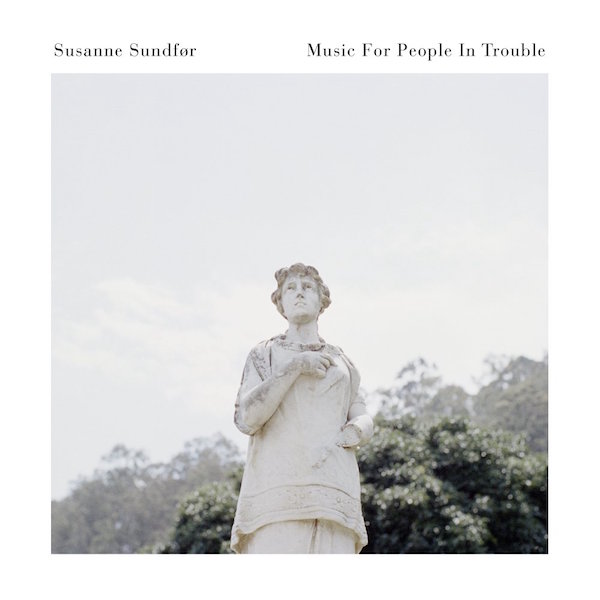One of Norway’s finest talents returns with trouble in mind
The success of her 2015 album Ten Love Songs managed to put Norwegian musician Susanne Sundfør on the map. Although she’d established herself in her native Norway through her previous albums, it was the striking synth-pop of songs such as ‘Fade Away’ and ‘Delirious’ that gave her a more global audience via the immediacy of her fourth studio album.
The process of producing Ten Love Songs was apparently a draining one that left Sundfør ill and depressed after its completion. On that basis, it’s probably not that surprising that she’s taken a left turn with her latest album Music For People In Trouble. Here, she’s harkened back to her singer-songwriter roots and although the album boasts some fine electronic flourishes, there’s also more nods to jazz and traditional instrumentation. There’s also some musique concrète thrown in for good measure. Sundfør also collaborated with fellow musician/producer Jørgen Træen (who had previously worked with Sundfør on her 2012 album The Silicone Veil) on the production of the new album.
The album’s opening track ‘Mantra’ strips everything back to acoustic guitar and voice to deliver a simple song that nevertheless has a sense of charm. It suggests the likes of Carole King or Joni Mitchell – both of which Sundfør acknowledges as influences. The use of steel guitar in the latter part of the song also gives it a texture that’s both familiar and beguiling.
‘Reincarnation’ continues in a similar fashion. The first track that she’d penned for the album, it offers a cryptical lyrical reverie on love, light and (as the title suggests) being reborn in some fashion. ‘Good Luck Bad Luck’, meanwhile, is a languid composition of piano and jazz elements that swirls around thoughts on a troubled romance.
By the point that ‘The Sound Of War’ rocks up, the album switches gear. Here, its the sound of birdsong and rivers that open up a multi-part composition while Sundfør delivers some often grim words (“Leave all that you were/‘Cause you won’t need it where you’re going tonight”). By the halfway point, the song falls into an unsettling electronic miasma with a constant drone giving a backdrop to brooding synth tones. In this fugue, Sundfør’s voice drifts as if from the depths of some dark ocean.
The title track is another oddity with its unsettling electronic bleeps and burps, over which naturist Andres Roberts gives a spoken word piece answering the question about what you would say to someone who had given up on life. It closes out with a gentle guitar and flute moment that seems completely divorced from the former part of the song.
‘Undercover’, which heralded the album as a single release, brings things back on track with an evocative piano and vocal arrangement that could have comfortably slotted into Ten Love Songs (“I wish I had a lover/Who’d keep it undercover”). The song later introduces elements of steel guitar and gentle synths and its closing bars provide a nod to her earlier album’s ability to showcase the soaring quality of her voice.
There’s a more mournful quality to ‘No One Believes In Love Anymore’ as the title certainly implies with its thoughts cast on the topic of doomed romance: “Pain is pleasure/And then just pain”. Meanwhile, the metaphor of a “punctured balloon” is so apt, it’s surprising that no one has used it previously. Again, the song takes a diversion in its latter parts, with the use of a flute at the end suggesting the pastoral melodies of Virginia Astley.
It’s the album’s closing numbers that perhaps show the strongest moments on Music For People In Trouble. Here, again, there’s the unusual choice of combining disparate approaches to song composition that deliver at times a fractured listening experience.
BUY NOW
‘The Golden Age’ opens with a spoken vocal piece ruminating on “We dream of stones now/All the softness has gone”. But it then delivers an incredibly immersive series of synth arpeggios and Sundfør’s mesmerising voice (“I wake from a dream/to be in another dream”). The song pauses at the midway point for an odd little piano refrain before returning to the honeyed melodies that mark out one of the album’s most satisfying moments.
But the album’s crowning achievement is clearly the epic ‘Mountaineers’ which starts with the basso profundo voice of John Grant. Here, Grant’s sonorous delivery echoes from the depths with its lines about “Jumbo jets spiralling down like vultures of the stars”. It’s suggestive of the type of composition that This Mortal Coil were noted for with the emphasis on the voice to provide an compelling hypnotic effect.
When Sundfør comes in, the song suggests a coming to the light from a great darkness, a sudden revelation (“What it means/Now I know”) and builds to a choral symphony that takes the breath away.
People expecting another Ten Love Songs will probably find Music For People In Trouble a challenging album. Certainly its desire to draw from so many different sounds and ideas can have a scattershot effect. But at the same time, as an album it works surprisingly well and showcases a musician whose talents are still unfolding.
Music For People In Trouble is out now on Bella Union.










